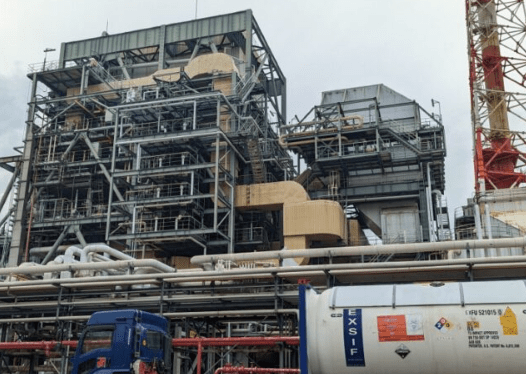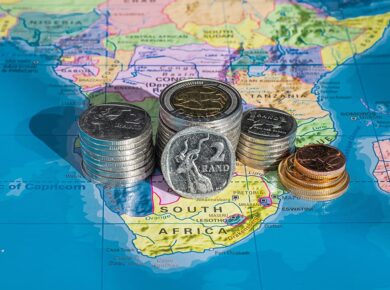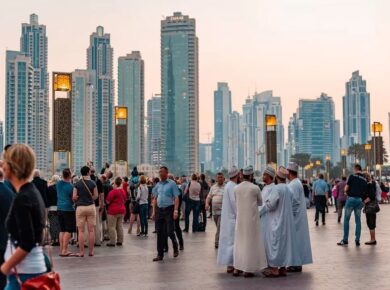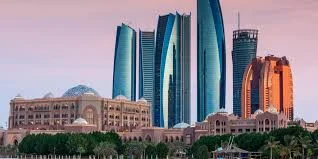The first accredited low-carbon ammonia shipment to Japan has been sent by Aramco and SABIC.
Saudi Aramco and Saudi Basic Industries Corp (SABIC) have dispatched the first-ever accredited low-carbon ammonia shipment to Japan, marking a significant milestone in the global effort to reduce carbon emissions.
The shipment was produced using a pioneering technology developed by SABIC that converts natural gas into hydrogen and captures the resulting carbon dioxide emissions. The carbon dioxide is then combined with nitrogen to create low-carbon ammonia, a key ingredient used in fertilizers and other chemical products.
The shipment, which was dispatched from Saudi Arabia’s Jubail port, is destined for Japan’s Itochu Corporation, a major trading company and one of SABIC’s long-term partners. The shipment is expected to arrive in Japan in May 2023.
The use of low-carbon ammonia represents a major step forward in the global effort to reduce carbon emissions and combat climate change. Ammonia is a key ingredient in the production of fertilizers, which are used to grow crops and feed the world’s growing population. However, the traditional process of producing ammonia is highly carbon-intensive, accounting for approximately 1.8% of global greenhouse gas emissions.
By utilizing low-carbon ammonia, we can significantly reduce the carbon footprint of fertilizer production while still meeting global food demand. Low-carbon ammonia also has potential applications in other industries, such as energy storage and fuel production, which could help further reduce emissions from transportation and other sectors.
The new low-carbon ammonia technology developed by SABIC and Aramco represents a major breakthrough in the effort to reduce carbon emissions from the production of ammonia. By capturing carbon dioxide emissions and using them to produce ammonia, the technology can significantly reduce the carbon footprint of the fertilizer industry.
The technology has been accredited by the International Sustainability and Carbon Certification (ISCC), a leading certification scheme for sustainable products and services. The ISCC certification provides assurance that the low-carbon ammonia produced by SABIC and Aramco meets rigorous sustainability standards, including environmental, social, and economic criteria.
The shipment of low-carbon ammonia to Japan is just the beginning of what is expected to be a major shift in the fertilizer industry. With growing demand for sustainable products and services, there is increasing pressure on companies to reduce their carbon footprint and adopt more sustainable practices.
The low-carbon ammonia technology developed by SABIC and Aramco is expected to play a major role in this shift, helping to reduce the carbon footprint of the fertilizer industry and create new opportunities for sustainable growth.
The shipment of low-carbon ammonia to Japan is also significant for Saudi Arabia, which has set ambitious targets for reducing its carbon emissions and transitioning to a more sustainable economy. The low-carbon ammonia technology developed by SABIC and Aramco is just one example of the country’s efforts to promote sustainable development and reduce its reliance on fossil fuels.
The success of the low-carbon ammonia shipment to Japan is a major milestone for SABIC and Aramco, demonstrating the potential of their innovative technology to drive sustainable growth and reduce carbon emissions. With growing demand for sustainable products and services, the companies are well-positioned to capitalize on the shift towards a more sustainable economy, creating new opportunities for growth and innovation.
Overall, the shipment of the first accredited low-carbon ammonia shipment to Japan by Aramco and SABIC represents a major breakthrough in the global effort to reduce carbon emissions and combat climate change. The innovative technology developed by the companies has the potential to transform the fertilizer industry, reducing its carbon footprint and promoting sustainable growth. As the world moves towards a more sustainable future, SABIC and Aramco are well-positioned to lead the way, creating new opportunities for growth and innovation while driving positive change for the environment and society.






SHOPEE สล็อต
… [Trackback]
[…] Read More on to that Topic: ceoweeklyuae.com/the-first-accredited-low-carbon-ammonia-shipment-to-japan-has-been-sent-by-aramco-and-sabic/ […]
December 17, 2024live cams
… [Trackback]
[…] Info on that Topic: ceoweeklyuae.com/the-first-accredited-low-carbon-ammonia-shipment-to-japan-has-been-sent-by-aramco-and-sabic/ […]
December 26, 2024healty living
… [Trackback]
[…] Read More Info here to that Topic: ceoweeklyuae.com/the-first-accredited-low-carbon-ammonia-shipment-to-japan-has-been-sent-by-aramco-and-sabic/ […]
December 27, 2024Yjgixz
stromectol 3 mg tablets price – atacand for sale online order carbamazepine pills
January 2, 2025look at this website
… [Trackback]
[…] Read More on to that Topic: ceoweeklyuae.com/the-first-accredited-low-carbon-ammonia-shipment-to-japan-has-been-sent-by-aramco-and-sabic/ […]
January 4, 2025Yppsps
accutane oral – zyvox 600 mg generic buy generic zyvox online
January 15, 2025Kvqahb
amoxicillin tablet – amoxil medication order combivent 100 mcg for sale
January 16, 2025Cieemt
buy azithromycin for sale – zithromax for sale online nebivolol 20mg pills
January 28, 2025Nvgnim
order omnacortil 40mg without prescription – azithromycin price buy progesterone without a prescription
January 31, 2025Lsm 991 เว็บพนัน เล่นได้ครบทุกเดิมพัน
… [Trackback]
[…] Here you will find 18508 additional Info to that Topic: ceoweeklyuae.com/the-first-accredited-low-carbon-ammonia-shipment-to-japan-has-been-sent-by-aramco-and-sabic/ […]
February 7, 2025สีพ่นรถยนต์
… [Trackback]
[…] Find More here to that Topic: ceoweeklyuae.com/the-first-accredited-low-carbon-ammonia-shipment-to-japan-has-been-sent-by-aramco-and-sabic/ […]
February 7, 2025Rizvct
brand neurontin – anafranil 50mg pill purchase itraconazole pill
February 8, 2025Uonyax
buy generic furosemide diuretic – lasix over the counter oral betamethasone
February 9, 2025Enohtm
vibra-tabs online order – albuterol inhalator medication generic glucotrol
February 13, 2025Lszdcr
oral augmentin 1000mg – buy augmentin pills for sale cymbalta 20mg generic
February 14, 2025Katrin
Asking questions are acdtually ice thging iif
February 17, 2025youu are not undersxtanding anything completely, but ths plst gives
pleazsant understandikng even.
Ffxxtt
buy generic augmentin 375mg – cost augmentin 1000mg duloxetine 40mg usa
February 22, 2025Ezwdng
rybelsus cheap – order generic vardenafil 20mg purchase cyproheptadine generic
February 24, 2025Ojvjoo
oral tizanidine – order tizanidine pills how to buy hydrochlorothiazide
February 27, 2025โอลี่แฟน
… [Trackback]
[…] Information on that Topic: ceoweeklyuae.com/the-first-accredited-low-carbon-ammonia-shipment-to-japan-has-been-sent-by-aramco-and-sabic/ […]
March 3, 2025Nvljaq
buy tadalafil sale – buy cialis 5mg online viagra 50mg uk
March 4, 2025Nxhtdi
sildenafil 50mg tablets – cialis tablets tadalafil 5mg drug
March 5, 2025ปั้มฟอล
… [Trackback]
[…] Read More Information here to that Topic: ceoweeklyuae.com/the-first-accredited-low-carbon-ammonia-shipment-to-japan-has-been-sent-by-aramco-and-sabic/ […]
March 5, 2025Adfllk
lipitor cheap – atorvastatin 20mg for sale purchase lisinopril generic
March 13, 2025Ifoqap
how to get cenforce without a prescription – generic cenforce glycomet 1000mg usa
March 15, 2025สมัคร แทงหวย 24 คาสิโน
… [Trackback]
[…] Find More Information here to that Topic: ceoweeklyuae.com/the-first-accredited-low-carbon-ammonia-shipment-to-japan-has-been-sent-by-aramco-and-sabic/ […]
March 18, 2025Ndrqbq
prilosec to treat reflux – lopressor where to buy tenormin online buy
March 20, 2025som777
… [Trackback]
[…] Find More Info here to that Topic: ceoweeklyuae.com/the-first-accredited-low-carbon-ammonia-shipment-to-japan-has-been-sent-by-aramco-and-sabic/ […]
March 21, 2025Vdvkwt
buy medrol 4 mg online – buy methylprednisolone 8 mg triamcinolone drug
March 26, 2025แนะนำค่ายเกมยอดฮิตในหมวด สล็อตออนไลน์ MM88BET
… [Trackback]
[…] Read More Information here on that Topic: ceoweeklyuae.com/the-first-accredited-low-carbon-ammonia-shipment-to-japan-has-been-sent-by-aramco-and-sabic/ […]
March 27, 2025Qvxktr
order desloratadine without prescription – clarinex 5mg canada order dapoxetine 60mg without prescription
March 28, 2025Zfxklz
generic misoprostol – diltiazem ca diltiazem 180mg generic
March 30, 2025